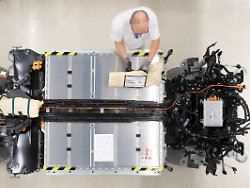Sunday 4th July 2021
Job killer and job machine
How is e-mobility changing the job market?
Saying goodbye to the internal combustion engine will shake up the German job market, that’s for sure. Experts disagree on the question of whether there will be more or fewer jobs at the end of the transformation to e-mobility. A study now holds out the prospect of a plus – especially in part of Germany.
The change in the direction of e-mobility is causing huge upheavals in the German core industry and has an impact on the labor market. Tens of thousands of jobs will be lost in the coming years, and tens of thousands will be created elsewhere. A study by the Agora Verkehrswende think tank and the Boston Consulting Group (BCG) now predicts a small plus of 25,000 jobs.
Other analyzes have recently been less optimistic. According to the current study, in a comparison of the years 2020 and 2030, the bottom line is that electric mobility will cost manufacturers 70,000 jobs because production will be less expensive. Suppliers focused on the powertrain are losing 95,000 jobs because their products are needed less often. Another 15,000 jobs are disappearing in the workshops because electric cars are generally less maintenance-friendly than combustion engines.
But the upheaval also has positive sides. The authors expect around 95,000 new jobs at other suppliers, for example for batteries. In addition, the charging infrastructure must be built and enough electricity must be produced, which should provide 95,000 jobs in energy infrastructure and production. There should be another 15,000 in plant engineering and services because car plants have to be rebuilt. The bottom line would be an increase of 25,000 jobs.
How big are episodes really?
Other predictions have spread less confidence in recent months. In May, the Munich-based Ifo Institute warned that by 2025 more jobs would be lost than employees would retire due to shrinking combustion engine production. Up to 221,000 jobs are at risk. In the study commissioned by the industry association VDA, the economists concentrated on the automotive industry itself.
At the end of 2020, on behalf of the Volkswagen Sustainability Advisory Board, the Fraunhofer Institute for Labor Economics and Organization came to the conclusion that e-mobility and networking would have “much smaller” consequences for employment in the group than assumed in earlier observations: in the six analyzed plants, the need for employees will decrease by 2900, the majority in the body shop or assembly would remain.
“The automotive world of work will change fundamentally in the coming decade,” said Kristian Kuhlmann from BCG. “There is a great need for retraining and further training for employees here.” For almost half of the around 1.7 million jobs in the branch and related branches of industry today, the job description is changing. With half a million employees there is a need for further training. It depends very much on whether a global corporation, a medium-sized company or a small supplier has to organize the turnaround for the workforce.
VDA: “Job transformation is not an automatism”
Large companies such as Volkswagen, BMW and Daimler are already investing a lot of money in “transformation” measures. The trade unions and governments of the three main German car countries Lower Saxony, Bavaria and Baden-Württemberg have also long recognized the issue. Lower Saxony, for example, has participated in the formation of regional “hubs” in order to facilitate the exchange, especially for less financially strong suppliers, and to encourage more advanced training.
“The transformation of jobs is not an automatic process, but depends on the right framework conditions that have to be created,” says a spokesman for the VDA about the current analysis. The Federal Employment Agency adjusts itself to problems with smaller suppliers. “Jobs subject to social security contributions will be lost, we have to reckon with that,” said BA boss Detlef Scheele at the beginning of June. Overall, however, he expects that the transformation process will “in all probability succeed relatively well”.
At the Agora Verkehrswende there is no alternative to the conversion: Holding onto the combustion engine is certainly not a way of securing the workforce, emphasized director Christian Hochfeld. “Electromobility is the only valid future scenario for cars in this decade.” He also warned: “If politics delays change, it would have a higher price for the economy: the loss of market share and thus also of employment.”
East Germany as a beneficiary of change
Transport Minister Andreas Scheuer (CSU), on the other hand, promotes “technology openness”. In addition to battery-powered vehicles, he also wants to use fuel cell cars and vehicles with synthetic fuels. VW boss Herbert Diess thinks little of it – he relies fully on the ramp-up of pure electric vehicles and considers the energy efficiency and cost structures of other drives to be clearly inferior.
Overall, the winners of the upcoming change could include the east of Germany, says Kuhlmann. He referred to the settlement of plants for the production of battery cells for electric cars. Specifically, the study assumes 16,000 additional jobs in the region. In contrast, it expects an increase of 6,000 in western Germany and 5,000 in northern Germany. The losers would be Bavaria and Baden-Württemberg, with projected declines of 2,000 jobs each.
.
